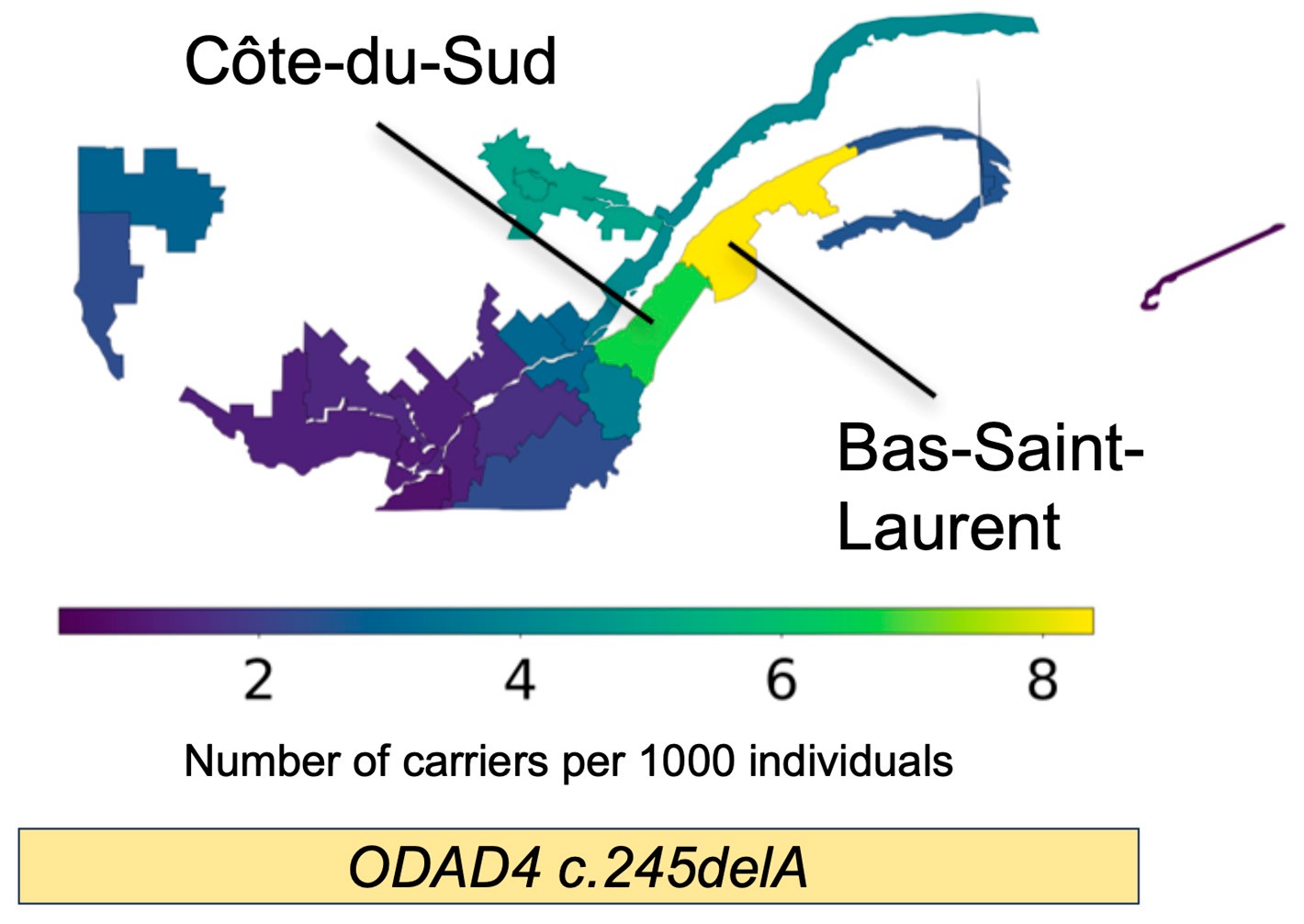A team of researchers have found a rare genetic form of primary ciliary dyskinesia linked to a single ancestor more than 300 years ago, potentially explaining unrecognized milder cases in Bas-Saint-Laurent and Côte-du-Sud.
A study led at the Research Institute of the McGill University Health Centre (The Institute) has identified a rare genetic variant in the ODAD4 gene that causes primary ciliary dyskinesia (PCD), a chronic hereditary disorder affecting the respiratory system. Through extensive genetic and genealogical analysis, the research team found strong evidence that this variant likely traces back to a single ancestor who lived roughly 330 years ago and may account for undetected PCD cases across Quebec-particularly in the Bas-Saint-Laurent and Côte-du-Sud regions.
The study also reveals that this variant can lead to a previously unrecognized milder form of PCD. The researchers' findings, published in Cells, could explain why some undiagnosed individuals experience chronic sinusitis, recurrent ear infections, persistent wet cough or severe nasal congestion from birth.
PCD is a rare genetic disorder that impairs the structure and function of cilia-microscopic hair-like structures that help move mucus out of the airways. When cilia do not work properly, mucus builds up, leading to chronic infections and inefficient mucociliary clearance. Over time, people with PCD typically develop bronchiectasis, an irreversible widening of the bronchial tubes that causes persistent mucus accumulation and is visible on medical imaging.

"This study is the first to describe a milder form of the disease that causes lifelong upper respiratory symptoms, but does not always progress to visible lung damage, and, importantly, to show that it is very likely associated with a Quebec founder variant," says Dr. Adam Shapiro, senior author of the study and founder of the McGill University Health Centre (MUHC) PCD clinic-the only specialized clinic in Quebec that provides state-of-the-art diagnostic testing, with phenotype and genotype testing.
"Our findings have immediate clinical implications. They mean there are people in Quebec, particularly in Bas-Saint-Laurent and Côte-du-Sud, who likely have PCD but have never been evaluated for it because their lungs appear 'too good,'" he adds.
The researchers' analyses revealed that carriers of the novel variant c.245delA likely descend from a single ancestor who lived roughly 330 years ago, during the French settlement of Quebec. Further simulations showed that the c.245delA variant is more common in two regions of eastern Quebec along the south shore of the Saint Lawrence River. In these areas, the estimated frequency of the variant is as follows:
- Bas-Saint-Laurent: 1 in 111 people
- Côte-du-Sud: 1 in 143 people
"This strong geographic concentration suggests a clear founder effect and indicates that additional PCD cases may exist in these regions, meaning physicians may be unknowingly caring for patients with the c.245delA variant causing their respiratory issues," says Dr. Shapiro, who is also Investigator in the Child Health and Human Development Research Program at The Institute, pediatric respirologist at the Montreal Children's Hospital of the MUHC and Associate Professor in the Department of Pediatrics at McGill University.

Reprinted from Bourassa et al. (2025), "ODAD4-related primary ciliary dyskinesia: report of five cases and a founder variant in Quebec," Cells, 14(18), 1460. https://doi.org/10.3390/cells14181460. CC BY 4.0.
From five patients to a population signal: how a Quebec founder variant emerged
In this study, the research team reported on five individuals with no familial relationship and with PCD caused by biallelic variants in ODAD4-meaning that both copies of the gene, one inherited from each parent, carried a disease-causing alteration. The patients were identified through clinical patients' referrals to the MUHC PCD clinic and through the Genetic Disorders of Mucociliary Clearance Consortium (GDMCC), a collaborative network involving eight research sites across North America led by the University of North Carolina (UNC). Researchers from McGill University, UNC and Yale University also contributed to this work.
Three of these individuals were of French-Canadian descent and shared the same novel homozygous variant, c.245delA, while the two other cases, identified in the United States, carried other ODAD4 variants.
Strikingly, two Quebec patients carrying the c.245delA variant, aged 14 and 38, displayed unusually mild lower-airway symptoms, with no evidence of bronchiectasis. Despite this milder lung involvement, both individuals still experienced significant chronic sinus disease, recurrent ear infections and a persistent wet cough. One patient also experienced fertility problems, another common consequence of PCD, due to the essential role of cilia in moving both sperm and eggs.
"The reason why the c.245delA variant in ODAD4 is associated with a milder form of the disease in some people remains unclear. Regional screening for this variant in Quebec may help identify additional cases and deepen our understanding of this newly recognized form of PCD," says Dr. Shapiro.
To determine whether the Quebec cases shared a common origin, the researchers combined whole-genome sequencing, state-of-the-art genetic modelling and four centuries of genealogical data. Using the CARTaGENE population database, which includes genetic and health information from 43,000 Quebecers, they identified carriers of the rare ODAD4 variant. Advanced analytical tools then enabled the team to trace how the variant was transmitted through generations and to link consenting carriers to the BALSAC database, which contains more than 400 years of birth, marriage and death records from across Quebec.
The next step: increasing diagnosis though targeted genetic testing
When PCD is diagnosed early, a treatment can be offered to help slow down its progression. Unfortunately, because PCD symptoms resemble many more common respiratory conditions, the disease often goes unnoticed. Diagnosis is also complex, requiring multiple assessments and specialized equipment to rule out other illnesses, as well as genetic tests to find variants that cause the disorder.
"Our findings underscore the importance of targeted genetic testing and closer partnerships with physicians in regions where this variant is more common," says Dr. Shapiro. "We encourage clinicians in these areas to refer patients with unexplained chronic respiratory symptoms for PCD evaluation. This will allow us to provide accurate diagnosis and appropriate care, better understand how this rare variant behaves across the population and uncover the mechanisms underlying milder forms of PCD-insights that will ultimately guide the development of better therapies."
About the study
"ODAD4-related primary ciliary dyskinesia: report of five cases and a founder variant in Quebec" by Marie-Hélène Bourassa, Guillaume Sillon, Shuizi Ding, Maurizio Chioccioli, Monkol Lek, Kaiyue Ma, Alejandro Mejia-Garcia, Simon Gravel, Donald C. Vinh, Michael R. Knowles, MargaretW. Leigh, Stephanie D. Davis, Thomas Ferkol, Kenneth N. Olivier, Elizabeth N. Schecterman, Weining Yin, Patrick R. Sears, Martina Gentzsch, Susan E. Boyles, William D. Bennett, Kirby L. Zeman, Lawrence E. Ostrowski, Maimoona A. Zariwala and Adam J. Shapiro, was published in Cells.
DOI: https://doi.org/10.3390/cells14181460
The researchers thank the PCD subjects and their families for their participation.
This research work was funded by the McGill Department of Pediatrics and the Montreal Children's Hospital Foundation, and directly or indirectly supported by various organizations including The Genetic Disorders of Mucociliary Clearance Consortium, the National Center for Advancing Translational Sciences, the National Heart, Lung, and Blood Institute, The American Thoracic Society Foundation, Genome Quebec (Ministère de l'Économie, de l'Innovation et de l'Énergie), the Canadian Partnership Against Cancer and Health Canada.






